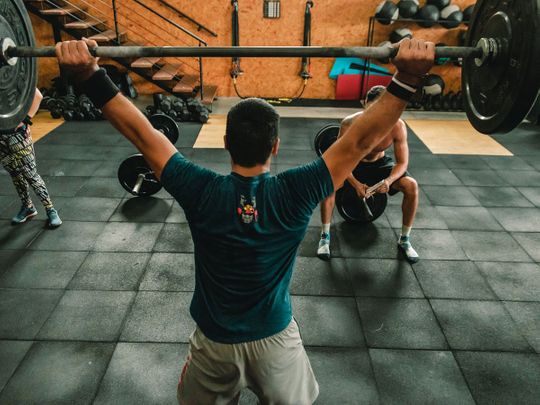
Dubai: Sometimes, we try and try again to lose the stubborn weight, and it’s just difficult. Being overweight could cause many health issues.
Some of the major health conditions that are related with obesity or weight gain are Heart Disease, Type 2 Diabetes, Hypertension, PCOS, Stroke, etc. These are all related to diet.
There are other factors involved like stress, lack of exercise or toxins, but by far the biggest contributors to those chronic illnesses is bad food.
Gulf News speaks to four trainers from Gym Nation who give us tips on the five important elements to consider when losing weight
- Training
- Recovery
- Motivation
- Nutrition
Meet Mahmoud Ibrahim, a certified Personal Trainer and Exercise Physiologist in Dubai.

How should I train?
Combining low to moderate intensity cardiovascular work with muscular hypertrophy and body-sculpting exercises (Weight Training) is agreat way to increase lean muscle mass and to decrease body fat. Low-to-moderate intensity exercise for a longer duration can result in a more significant body-fat loss than higher intensity-shorter duration exercise.
Gaining muscle mass can significantly increase the Resting Metabolic Rate (RMR), therefore leading to a greater number of calories burned, even at rest. So I recommend an aerobic exercise intensity of 65 per cent to 75 per cent Max HR (Heart Rate) and 70 per cent to 85 per cent Repetition Max (8 to 12 Reps) of muscular focussed work for optimizing positive body composition changes.
How often should I train?
Cardio
Ideally you should engage in aerobic activities on most days of the week for more calorie burning and also because most of the researches have shown that cardiovascular training once or twice per week only helps to maintain fitness. It does not actually provide enough of a stimulus for significant fitness gains. For the cardiovascular system to adapt to exercise by improving its fitness, training needs to occur three to five times per week.
Weights
For Weight Training, two to three full-body workouts per week should be enough to produce significant strength and endurance gains. For those who prefer to exercise more frequently, training the same muscles on two consecutive should be avoided. those who work at higher load should allow a longer resting period between training sessions. I would like also to mention that 1 lb of muscles can burn 30 to 60 calories a day.
Meet Sherrill Salamat

What should I do during recovery?
Training is important to achieve our fitness goal, but recovery is just as important. Intense weight training causes micro tears to form in our muscles. Recovery allows our muscles to rebuild.
Recommendations
Sleep well
HGH (Human Growth Hormone) is very important in the repair of muscle tissue. It is naturally produced by our body during our sleep. This is also the time that we allow our brain to recharge. Ideal sleeping hours varies between 7-10 hours, relative to the need of an individual. Athletes who aim for performance, should have 8-10 hours of sleep and generally those who train 3-4 times a week should have 7-9 hours of sleep.
Proper Nourishment
We deplete our body of nutrients when we train, so it is very important to refuel our body with nutritious food. Protein is made up of amino acid which is the building block of our muscles. We usually use carbohydrates or fats in our metabolic conditioning, depending on the intensity of the training. So generally, maintaining a well balance diet of all food macros, protein, carbs and fats is very important to "rebuild" our body.
Foam Rolling
It helps reduce pain and muscle soreness. It promotes blood circulation in our body which delivers nutrients and oxygen to our cells which is important for our recovery. Ideally, we should foam roll for 10-15 minutes a day after training.
Get a massage
This helps get rid of lactic acid (produce in the muscles after intense training which could lead to painful and sore muscles), promotes blood circulation and reduce muscular tension.
Stretch
Stretching after a workout helps promote blood circulation, gets rid of lactic acid and increases range of motion. It is also relaxing.
Meet Jason Young, a qualified Sports Conditioning Coach with professional athletes as clients including some Premier League footballs and rising MMA Stars.

How do I stay motivated?
Being self motivated is hard at the best of times, and it's even harder when you just get back off holiday. But what I would say is get back in the gym as soon as possible. The longer you leave it the harder it will become. So try and get back into some sort of routine, even if it means taking it easy for a few days until you're back in the swing of things
Then if you still can't get yourself motivated join some group classes, train with friends or recruit the help of a personal trainer.
Meet David Revell. He combines workouts with nutritional guidance to acheive results.

What should I eat?
Nutrition is the basis for reaching your desired body shape, without proper nutrition you would not be able to achieve your goal despite working out so hard. Therefore, it is essential to what and how much to eat. Based on my experience with clients, the best way to guarantee losing the excess holiday weight is to calculate calories. While some might think it’s difficult, it actually only takes a few minutes to plan your food today and eat to make your goals a reality!
One needs to start by determining his/her base metabolic rate (BMR); this can be done using various methods and there are many calculators online.
Next, one has to factor his/her activity level depending on his/her lifestyle and job in order to determine his/her Total Daily Energy Expenditure (TDEE). This again can be done very easily through online calculators. I would recommend using the Mifflin St Jeor formula to determine the BMR and TDEE. While no formula is accurate 100 per cent for all cases, this is a good place to start.
Once the TDEE is calculated, one needs to eat about 300-400 calories less than his/her TDEE in order to guarantee fat loss.
Last, one has to monitor his/her weight closely and make sure their average weekly weight decreases over time (about 1 kg lost every 2 weeks or more is a good rate). If the average weight doesn’t decrease then all you need to do is decrease another 100-200 calories and try again.







